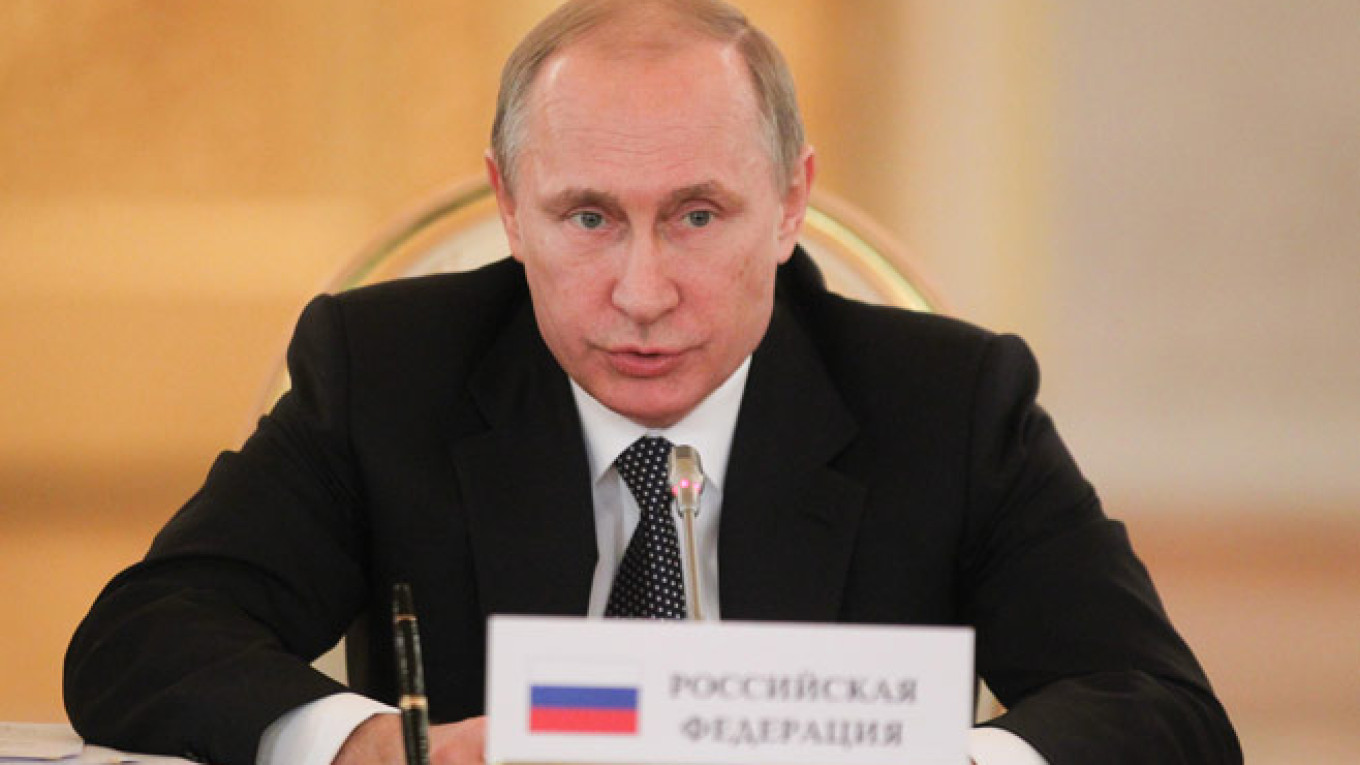BEIRUT — Syrian troops backed by Russian air strikes advanced against insurgents in the center of the country as President Vladimir Putin defended Moscow's intervention in the conflict, saying it would aid efforts to reach a political settlement.
Putin said Moscow's objective was to stabilize the Syrian government and create conditions for a political compromise.
"When a division of international terrorists stands near the capital, then there is probably little desire for the Syrian government to negotiate, most likely feeling itself under siege in its own capital," he said in an interview with Russian state television broadcast on Sunday.
The fighting Sunday was on multiple fronts in the northern part of the central Hama province and the nearby rebel-held Idlib province. A Syrian military official said troops seized the northern Hama village of Tak Sukayk. He spoke on condition of anonymity in line with regulations.
It was the second village in the area captured by the government since it launched a wide-ranging ground offensive made possible by Russian air strikes that began Sept. 30.
In an audio recording, a Saudi militant cleric based in Syria urged fighters to unite, mobilize and attack Syrian forces in different provinces in order to avert "consecutive collapses."
Abdullah al-Muhaysini, who is linked to al-Qaida's affiliate in Syria, the Nusra Front, said the Russians aim to distract the insurgents on different fronts ahead of a surprise attack.
"We have to turn that equation around before the infidels seize the initiative," al-Muhaysini said in the recording, which was first shared by the Britain-based Syrian Observatory for Human Rights.
"If there is no vicious counterattack to penetrate the front defensive lines of the regime, the future will be frightening."
Shaam News Network, a group of anti-government activists, said several insurgent groups, including the Nusra Front, have formed a joint operations room for activities in Hama and Idlib.
The rebels seized almost all of Idlib in September and hold territory in northern Hama and rural Latakia, a coastal province that is a major stronghold for President Bashar Assad and the Alawite religious minority to which he belongs.
Human Rights Watch meanwhile said that an advanced type of Russian cluster munition was used in an air strike southwest of Aleppo on Oct. 4, as part of what photographs and videos suggest is renewed use of the air-dropped and ground-fired munitions.
The New York-based rights group said it could not determine whether Russian or Syrian forces were responsible for the apparent use of the munitions, which descend by parachute and are designed to destroy armored vehicles but can also pose a major hazard to civilians.
Russia, a key ally of Assad, is a major arms supplier to Syria. Neither country has banned cluster munitions.
There was no immediate comment from Russia's Defense Ministry.
Russia says its strikes are mainly aimed at the Islamic State group and other "terrorists," but the ground-and-air offensive is being waged in areas controlled by mainstream rebels as well as al-Qaida's Syrian affiliate.
U.S. officials say Russia has directed parts of its air campaign against U.S.-funded groups and other moderate opposition groups in a concerted effort to weaken them.
The Observatory, a monitoring group that relies on a network of activists on the ground, said the rebels advanced overnight on a hill overlooking Atshan, a village recently captured by the government. The group said the rebels shelled troops in the newly seized territory.
The state-run SANA news agency said government forces destroyed at least 20 vehicles loaded with ammunition, and some with heavy machine guns, east of Tak Sukayk, killing the "terrorists" on board.
The Local Coordination Committees, another activist-run monitoring group, said government helicopters and suspected Russian jets struck at a third village, Tamanah, north of Atshan and Tak Sukayk. Tamanah lies on the border with Idlib.
Both the Observatory and the LCC reported intense clashes and Russian air strikes in rural Latakia. The Observatory said there were Russian air strikes there too.
The Russian military said Sunday its jets had carried out 64 sorties in the past day, targeting 63 sites in the Hama, Idlib, Latakia and Raqqa provinces. It said an artillery system and a training base were destroyed in separate strikes in Idlib, and that attacks in the Latakia province destroyed military vehicles equipped with anti-aircraft weapons and mortars.
Putin said he planned to discuss the Syrian crisis on Sunday with Abu Dhabi Crown Prince Sheikh Mohamed bin Zayed Al Nahyan in Sochi, where the two men attended a Formula One race. He also plans to meet with Saudi Arabia's defense minister. Riyadh is one of the leading backers of rebels fighting to overthrow Assad.
A Message from The Moscow Times:
Dear readers,
We are facing unprecedented challenges. Russia's Prosecutor General's Office has designated The Moscow Times as an "undesirable" organization, criminalizing our work and putting our staff at risk of prosecution. This follows our earlier unjust labeling as a "foreign agent."
These actions are direct attempts to silence independent journalism in Russia. The authorities claim our work "discredits the decisions of the Russian leadership." We see things differently: we strive to provide accurate, unbiased reporting on Russia.
We, the journalists of The Moscow Times, refuse to be silenced. But to continue our work, we need your help.
Your support, no matter how small, makes a world of difference. If you can, please support us monthly starting from just $2. It's quick to set up, and every contribution makes a significant impact.
By supporting The Moscow Times, you're defending open, independent journalism in the face of repression. Thank you for standing with us.
Remind me later.


